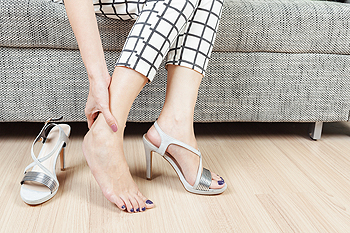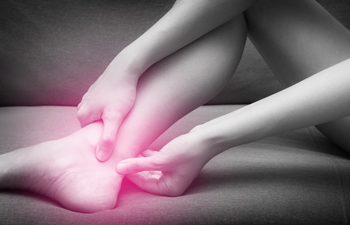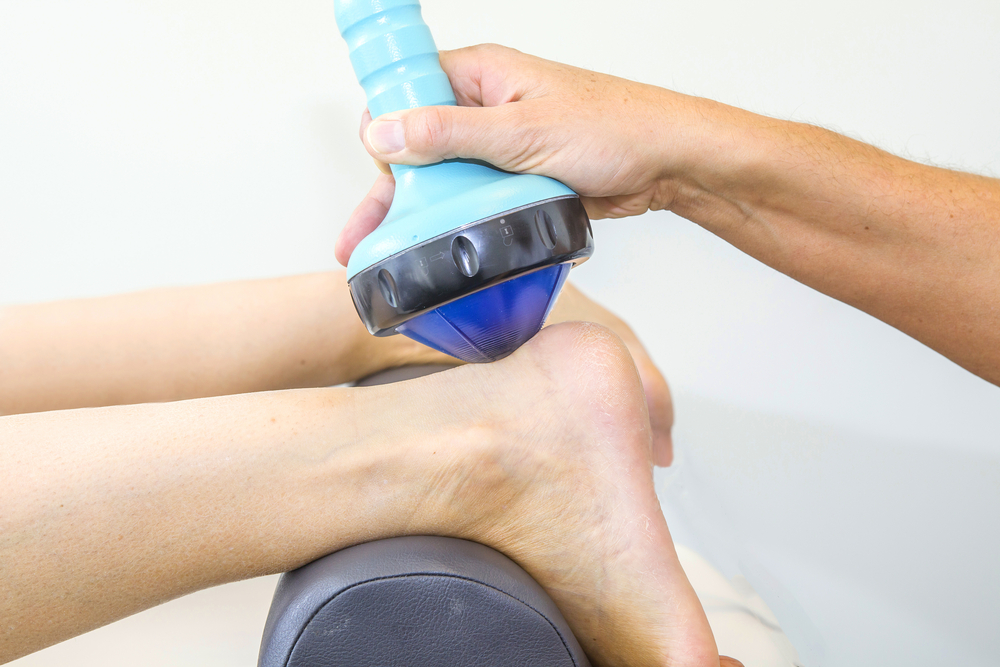August 2021
Can Falling Be Prevented?
 Falling is a common fear many of us are born with. When adults fall it can induce damage to the body, and the feet are often affected. Research has indicated many people over the age of sixty-five fall, and it is helpful to implement preventive methods into their living environment. These can include removing frayed rugs and improving lighting in the household. Additionally, it is beneficial to install grab bars in the shower and toilet area, and many patients find it useful to use a bathmat. It is important to have regular physical and eye examinations, where current medication can also be monitored. Many patients perform frequent stretching and exercise routines as this is often a key factor that can help to ensure strong bodies. If you would like more information about preventing falls and how falling can affect the feet, please consult with a podiatrist.
Falling is a common fear many of us are born with. When adults fall it can induce damage to the body, and the feet are often affected. Research has indicated many people over the age of sixty-five fall, and it is helpful to implement preventive methods into their living environment. These can include removing frayed rugs and improving lighting in the household. Additionally, it is beneficial to install grab bars in the shower and toilet area, and many patients find it useful to use a bathmat. It is important to have regular physical and eye examinations, where current medication can also be monitored. Many patients perform frequent stretching and exercise routines as this is often a key factor that can help to ensure strong bodies. If you would like more information about preventing falls and how falling can affect the feet, please consult with a podiatrist.
Preventing falls among the elderly is very important. If you are older and have fallen or fear that you are prone to falling, consult with one of our podiatrists from Bazzi Podiatry. Our doctors will assess your condition and provide you with quality advice and care.
Every 11 seconds, an elderly American is being treated in an emergency room for a fall related injury. Falls are the leading cause of head and hip injuries for those 65 and older. Due to decreases in strength, balance, senses, and lack of awareness, elderly persons are very susceptible to falling. Thankfully, there are a number of things older persons can do to prevent falls.
How to Prevent Falls
Some effective methods that older persons can do to prevent falls include:
- Enrolling in strength and balance exercise program to increase balance and strength
- Periodically having your sight and hearing checked
- Discuss any medications you have with a doctor to see if it increases the risk of falling
- Clearing the house of falling hazards and installing devices like grab bars and railings
- Utilizing a walker or cane
- Wearing shoes that provide good support and cushioning
- Talking to family members about falling and increasing awareness
Falling can be a traumatic and embarrassing experience for elderly persons; this can make them less willing to leave the house, and less willing to talk to someone about their fears of falling. Doing such things, however, will increase the likelihood of tripping or losing one’s balance. Knowing the causes of falling and how to prevent them is the best way to mitigate the risk of serious injury.
If you have any questions, please feel free to contact one of our offices located in Detroit, West Detroit, Northwest Detroit, Sterling Heights, Hamtramck and Dearborn Heights, MI . We offer the newest diagnostic and treatment technologies for all your foot care needs.
Who Can Achilles Tendonitis Affect?
The Achilles tendon connects the heel with two large muscles in the calf that allows the foot to push off. This pushing off motion is necessary for walking, running, and jumping. Achilles tendonitis is a painful inflammation of this tendon where it connects at the heel. In younger people, Achilles tendonitis may develop from overuse. This may be from increasing the intensity of an activity suddenly, running too often on hard surfaces for longer distances, jumping excessively, or wearing shoes without proper support. It may also occur if the foot turns in or out abruptly. In older and middle-aged adults, Achilles tendonitis may be caused by arthritis, bone spurs, and other conditions that aggravate or put excess tension on the tendon. If you have pain in your heel a podiatrist can examine you to determine the origin and develop an effective treatment plan that is specific for you.
Achilles tendon injuries need immediate attention to avoid future complications. If you have any concerns, contact one of our podiatrists of Bazzi Podiatry. Our doctors can provide the care you need to keep you pain-free and on your feet.
What Is the Achilles Tendon?
The Achilles tendon is a tendon that connects the lower leg muscles and calf to the heel of the foot. It is the strongest tendon in the human body and is essential for making movement possible. Because this tendon is such an integral part of the body, any injuries to it can create immense difficulties and should immediately be presented to a doctor.
What Are the Symptoms of an Achilles Tendon Injury?
There are various types of injuries that can affect the Achilles tendon. The two most common injuries are Achilles tendinitis and ruptures of the tendon.
Achilles Tendinitis Symptoms
- Inflammation
- Dull to severe pain
- Increased blood flow to the tendon
- Thickening of the tendon
Rupture Symptoms
- Extreme pain and swelling in the foot
- Total immobility
Treatment and Prevention
Achilles tendon injuries are diagnosed by a thorough physical evaluation, which can include an MRI. Treatment involves rest, physical therapy, and in some cases, surgery. However, various preventative measures can be taken to avoid these injuries, such as:
- Thorough stretching of the tendon before and after exercise
- Strengthening exercises like calf raises, squats, leg curls, leg extensions, leg raises, lunges, and leg presses
If you have any questions please feel free to contact one of our offices located in Detroit, West Detroit, Northwest Detroit, Sterling Heights, Hamtramck and Dearborn Heights, MI . We offer the newest diagnostic tools and technology to treat your foot and ankle needs.
The Many Causes of Heel Pain
 Heel pain can have a variety of causes, but the most common cause of it is plantar fasciitis. This occurs when the long band of tissue on the sole of the foot becomes inflamed. Women late in their pregnancy and people who waitress or work on their feet all day may be more at risk for developing this type of heel pain. Other causes of heel pain can include: a small crack in the heel bone, compressed nerves, worn down heel pads, nerve damage, thickened tissue surrounding a nerve, inflammation of the tendon that connects the heel bone with the calf muscles, plantar warts, and abnormalities in the bone which can causes inflammation of the bursa sac. There may also be injury to the tunnel between the heel and talus bones known as Sinus Tarsi Syndrome. If you are struggling with any type of pain in your heel it is suggested that you schedule an appointment with a podiatrist for an accurate diagnosis and proper treatment.
Heel pain can have a variety of causes, but the most common cause of it is plantar fasciitis. This occurs when the long band of tissue on the sole of the foot becomes inflamed. Women late in their pregnancy and people who waitress or work on their feet all day may be more at risk for developing this type of heel pain. Other causes of heel pain can include: a small crack in the heel bone, compressed nerves, worn down heel pads, nerve damage, thickened tissue surrounding a nerve, inflammation of the tendon that connects the heel bone with the calf muscles, plantar warts, and abnormalities in the bone which can causes inflammation of the bursa sac. There may also be injury to the tunnel between the heel and talus bones known as Sinus Tarsi Syndrome. If you are struggling with any type of pain in your heel it is suggested that you schedule an appointment with a podiatrist for an accurate diagnosis and proper treatment.
Many people suffer from bouts of heel pain. For more information, contact one of our podiatrists of Bazzi Podiatry. Our doctors can provide the care you need to keep you pain-free and on your feet.
Causes of Heel Pain
Heel pain is often associated with plantar fasciitis. The plantar fascia is a band of tissues that extends along the bottom of the foot. A rip or tear in this ligament can cause inflammation of the tissue.
Achilles tendonitis is another cause of heel pain. Inflammation of the Achilles tendon will cause pain from fractures and muscle tearing. Lack of flexibility is also another symptom.
Heel spurs are another cause of pain. When the tissues of the plantar fascia undergo a great deal of stress, it can lead to ligament separation from the heel bone, causing heel spurs.
Why Might Heel Pain Occur?
- Wearing ill-fitting shoes
- Wearing non-supportive shoes
- Weight change
- Excessive running
Treatments
Heel pain should be treated as soon as possible for immediate results. Keeping your feet in a stress-free environment will help. If you suffer from Achilles tendonitis or plantar fasciitis, applying ice will reduce the swelling. Stretching before an exercise like running will help the muscles. Using all these tips will help make heel pain a condition of the past.
If you have any questions please contact one of our offices located in Detroit, West Detroit, Northwest Detroit, Sterling Heights, Hamtramck and Dearborn Heights, MI . We offer the newest diagnostic and treatment technologies for all your foot and ankle needs.
Arthritis Can Cause Pain in the Feet and Ankles
Is Shockwave Therapy Painful?
Shockwave therapy is a potential treatment option for various foot and ankle conditions, particularly chronic plantar fasciitis, which causes pain in the heel and arch. Shockwave therapy is a non-invasive treatment that uses pressurized air or electromagnetic pulses to stimulate the body’s natural healing processes in the affected area. There are two main types of shockwave treatments - low energy and high energy. Low energy shockwave treatments are typically painless or mildly painful. High energy shockwave treatments can be painful and sometimes require anesthesia. If you have chronic plantar fasciitis and conservative treatments have not helped, shockwave therapy may be another treatment option for you to consider. To learn more about this and other treatments for plantar fasciitis, please consult with a podiatrist.
Shockwave therapy is a treatment commonly used to treat various injuries and conditions, particularly plantar fasciitis in the feet. To learn more, consult with one of our podiatrists from Bazzi Podiatry. Our doctors can provide the care you need to keep you pain-free and on your feet.
Shockwave Therapy
Shockwave therapy is a new treatment option designed to treat bone conditions such as tennis elbow, shoulder pain, and others. Shockwave therapy uses high intensity sound waves that are directed to the affected tissues of the body with pinpoint accuracy. The effects are very beneficial, leading to a production of collagen fibers, eliminating inflammation.
Who Benefits from Shockwave?
Shockwave is recommended for patients suffering from heel pain and associated problems. Heel pain is a common condition which can be caused by obesity, overexertion, and spending a substantial amount of time on hard floors with your feet exposed and unsupported.
Fast and Easy
The therapy is actually a simple process that can leave patients feeling better the very next day. Shockwave therapy is not as dramatic as it sounds. It enables more blood flow to effected areas, addressing the source of the problem and allowing treatment to last for a long time.
Treatment & Recovery Time
Shockwave treatment will enable your feet to recover quickly. This is especially important since surgery is not required. It is cost effective and does not require the use of anesthesia. This treatment is a better option to surgery, since it is proven safe.
If you have any questions, please feel free to contact one of our offices located in Detroit, West Detroit, Northwest Detroit, Sterling Heights, Hamtramck and Dearborn Heights, MI . We offer the newest diagnostic and treatment technologies for all your foot and ankle needs.
How High Heels Can Damage the Feet
 Wearing high heels can be stylish, but wearing them too often may have severe long term impacts on the feet. While wearing high heels, the ankles are forced to bend forward and essentially make it like the wearer is standing on their tip toes. This can lead to potential problems like restricting blood circulation, or shortening of the calf muscles as well as the Achilles tendon. High heels with a narrow toe box can lead to other problems too, such as bunions. Because of the stress that these shoes put on the body, osteoarthritis is yet another condition that may result from wearing high heels frequently. Not only do high heels have an impact on the feet, but high heels can lead to concerns with your back and knees as well. If you are experiencing any problems with your feet due to high heels, please consult with your local podiatrist. A podiatrist will be able to treat any foot condition that may have developed, as well as provide shoe inserts or orthotics, and make recommendations on other stylish shoes that can be healthier for your feet.
Wearing high heels can be stylish, but wearing them too often may have severe long term impacts on the feet. While wearing high heels, the ankles are forced to bend forward and essentially make it like the wearer is standing on their tip toes. This can lead to potential problems like restricting blood circulation, or shortening of the calf muscles as well as the Achilles tendon. High heels with a narrow toe box can lead to other problems too, such as bunions. Because of the stress that these shoes put on the body, osteoarthritis is yet another condition that may result from wearing high heels frequently. Not only do high heels have an impact on the feet, but high heels can lead to concerns with your back and knees as well. If you are experiencing any problems with your feet due to high heels, please consult with your local podiatrist. A podiatrist will be able to treat any foot condition that may have developed, as well as provide shoe inserts or orthotics, and make recommendations on other stylish shoes that can be healthier for your feet.
High heels have a history of causing foot and ankle problems. If you have any concerns about your feet or ankles, contact one of our podiatrists from Bazzi Podiatry. Our doctors can provide the care you need to keep you pain-free and on your feet.
Effects of High Heels on the Feet
High heels are popular shoes among women because of their many styles and societal appeal. Despite this, high heels can still cause many health problems if worn too frequently.
Which Parts of My Body Will Be Affected by High Heels?
- Ankle Joints
- Achilles Tendon – May shorten and stiffen with prolonged wear
- Balls of the Feet
- Knees – Heels cause the knees to bend constantly, creating stress on them
- Back – They decrease the spine’s ability to absorb shock, which may lead to back pain. The vertebrae of the lower back may compress.
What Kinds of Foot Problems Can Develop from Wearing High Heels?
- Corns
- Calluses
- Hammertoe
- Bunions
- Morton’s Neuroma
- Plantar Fasciitis
How Can I Still Wear High Heels and Maintain Foot Health?
If you want to wear high heeled shoes, make sure that you are not wearing them every day, as this will help prevent long term physical problems. Try wearing thicker heels as opposed to stilettos to distribute weight more evenly across the feet. Always make sure you are wearing the proper shoes for the right occasion, such as sneakers for exercising. If you walk to work, try carrying your heels with you and changing into them once you arrive at work. Adding inserts to your heels can help cushion your feet and absorb shock. Full foot inserts or metatarsal pads are available.
If you have any questions please feel free to contact one of our offices located in Detroit, West Detroit, Northwest Detroit, Sterling Heights, Hamtramck and Dearborn Heights, MI . We offer the newest diagnostic and treatment technologies for all your foot and ankle needs.







